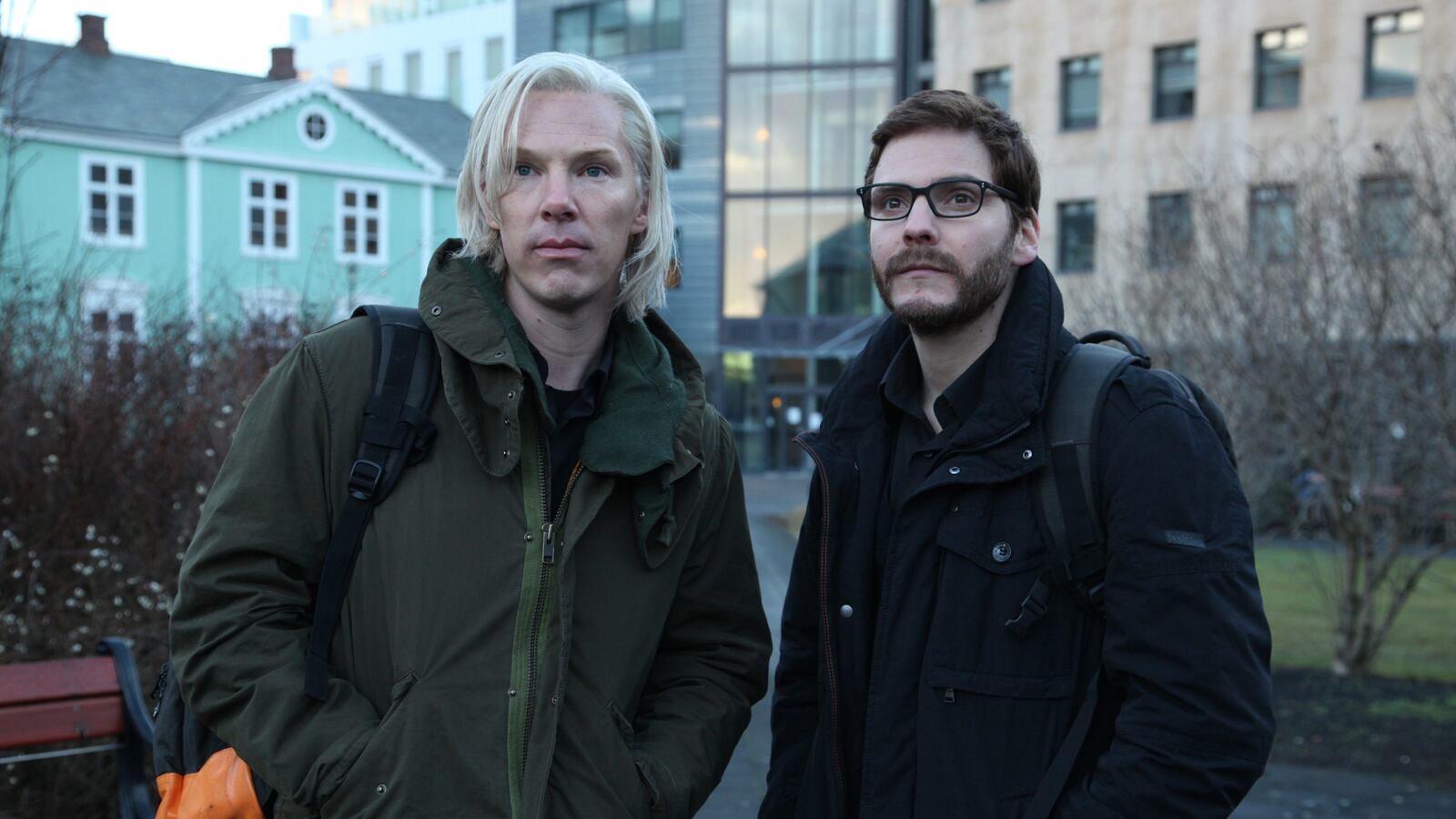
The 38th edition of the Toronto International Film Festival—or TIFF—kicked off Thursday evening with a touching tribute to the late film critic Roger Ebert, followed by the world premiere of The Fifth Estate, a film dramatizing the rise of WikiLeaks, the rogue publishing organization responsible for unveiling the “Iraq War Logs,” “Afghan War Diary,” and U.S. State Department diplomatic cables, along with many other classified documents.
Estate is directed by Bill Condon, who’s best known among mainstream moviegoers for helming the last two Twilight films and, among more discerning cineastes, for his noteworthy biopics Gods and Monsters and Kinsey. It is adapted from Daniel Domscheit-Berg’s book Inside WikiLeaks: My Time With Julian Assange at the World’s Most Famous Website.
The story begins at a hacker conference in 2007. WikiLeaks, a little-known organization founded by Julian Assange (Benedict Cumberbatch), has gained a degree of notoriety within the hacking community for publishing information about the corrupt practices of Kenyan leader Daniel arap Moi. One of the site’s admirers is Daniel Domscheit-Berg (Daniel Bruhl), a German tech wiz whom Assange immediately trusts, even confiding in him about his mother’s abusive boyfriend who was a member of the Aussie cult “The Family,” and used to abuse young Julian and force feed him psychiatric drugs. “Why do you think my hair’s white?” he says.
Before long, Domscheit-Berg is serving as Assange’s—and WikiLeaks’s—right-hand man. “You can change the world with a great idea, but you need people to put themselves on the line,” exclaims Assange. The duo, who do almost all the work themselves, enjoy a string of early successes, including the publication of documents alleging illegal activities at the Cayman Islands branch of the Swiss bank Julius Baer, the membership list of the far-right British National Party, and more. Oddly, WikiLeaks’s first major coup, the Kaupthing Bank documents leak—which preceded the Icelandic financial crisis—is glossed over. The site really starts to gain steam in April 2010, when it released gunsight footage showing civilians and two Reuters journalists being shot by an Apache helicopter in Baghdad in what Assange dubbed the “Collateral Murder” video. As WikiLeaks gains more traction, its snowy-haired, urbane leader becomes more and more shaken and withdrawn, and eventually things come to a head in the buildup to the release of the “Afghan War Diary,” a collection of over 76,900 classified documents about the war in Afghanistan, which was released in coordination with The New York Times, Der Spiegel, and The Guardian. Assange wanted the documents to be published sans redactions, while Domscheit-Berg thought otherwise.
Unlike his previous biopics, The Fifth Estate doesn’t provide a full-bodied portrait of its subject. Assange only vaguely alludes to his past, including his mother’s relationship with a boyfriend in the aforementioned Aussie cult, which forced its adherents to dye their hair white, and Assange’s teenage hacking years under the name “Mendax” (a phrase taken from Horace meaning “noble lie”). The film never goes into how WikiLeaks is funded other than mentioning it’s “by donations,” or Assange’s Sweden incident and subsequent asylum(s) in various countries, or Domscheit-Berg’s destruction of the Bank of America files. It just covers well-worn territory.
Another mistake is having the action viewed through Domscheit-Berg’s perspective instead of Assange’s, since Assange is the more interesting one. Instead of a compelling character study, we’re treated to a battle of wills between a frustratingly opaque Asperger’s-y genius (Assange) and a wide-eyed idealist (Domscheit-Berg). If this all sounds familiar, it should, because we saw a similar clash in David Fincher’s far superior The Social Network.
While Cumberbatch’s performance as Assange is spot-on—from the Aussie accent to his creepy aura to his out-of-this-world dance moves—since the character is so thinly written and the story viewed through Domscheit-Berg’s eyes, he remains a complete mystery. There’s no Erica Albright in this tale, just more question marks.
The Fifth Estate is also teeming with extraneous storylines, including Domscheit-Berg’s relationship with his stunning co-worker, played by Alicia Vikander, and Laura Linney’s wasted turn as a U.S. State Department representative who is forced to take the fall in the wake of the cables leak. In fact, it’s odd that the fallout from the diplomatic cables is treated as more damaging than that of the “Afghan War Diary” or the “Iraq War Logs,” considering it actually didn’t amount to much. There are also several groan-worthy visual devices in Estate that seem far more suitable to the Twilight universe, e.g., when WikiLeaks’s user-submit function is disabled, we’re shown Assange standing in a snowy field surrounded by burning stacks of paper. The film also continually flashes to a virtual office/dreamscape to visualize what’s going on inside Domscheit-Berg’s head. It’s very silly.
And Bradley Manning (now Chelsea), the soldier who actually leaked all the documents to Assange, is barely mentioned. Why are Hollywood filmmakers so keen on Assange and not the transgendered U.S. Army private who stole all these documents on a CD labeled “Lady Gaga,” was ratted out by his “friend” Adrian Lamo, served time in extreme solitary confinement at Quantico, and is now in jail serving a 35-year prison sentence for violating the Espionage Act? That would make one helluva movie.






